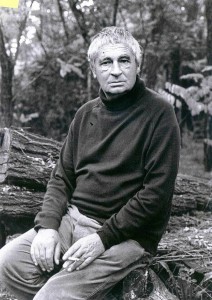 German poet Peter Huchel was born on the outskirts of Berlin in 1903 and lived through the turbulent times of two world wars and the subsequent splintering of his home city into east and west. He remains one of the most outspoken writers of the communist era and spent almost half his life behind the Iron Curtain fighting against the censorship of his work.
German poet Peter Huchel was born on the outskirts of Berlin in 1903 and lived through the turbulent times of two world wars and the subsequent splintering of his home city into east and west. He remains one of the most outspoken writers of the communist era and spent almost half his life behind the Iron Curtain fighting against the censorship of his work.
Huchel passed a large part of his childhood living in the countryside near Brandenburg at the home of his grandfather something that was a big influence on his early poetry. As a young man he explored the natural world and would later, in his twenties, experiment with the Naturlyrik movement. He was well educated and went to universities in Humboldt and Freiburg before spending time in Vienna where he studied literature and philosophy.
After finishing his education in 1927, Huchel traveled across Europe and survived on odd jobs such as working as a farm hand in France. He also went to the Balkans and reached as far as Turkey before deciding to return to Berlin. Perhaps because of his travels and the growing turmoil within Germany, Huchel’s work began to move away from the natural world and became more socially aware.
When war broke out in 1939, he was forced into the German army and spent almost five years fighting on the front. Huchel was eventually captured by the Russians which would seal his future after the end of the war. With the cessation of hostilities, he was sent to the Russian occupied part of his home city which would later become East Berlin.

In the few years after the war, Huchel published his first collection of poetry, Gedichte, and by the end of the 1940s had found himself a job as the editor of Sinn Und Form, a literary and cultural journal that he helped to make into one of communist Germany’s most controversial publications. Despite pressure from the regime, Huchel was able to publish the work of many Western writers including Sartre and Neruda.
By the early 1960s, however, he had become more well-known to the communist authorities and was beginning to encounter censorship of his work. He was dismissed from the post of editor at Sinn Und Form and there was a sudden reluctance to publish any of his new poetry. To get round this, as with so many Soviet Block poets, Huchel utilized friendships and contacts in the West.

His second collection of poetry, Roads, Roads: Poems, was published a year after he lost his job at Sinn Und Form but relied on a publisher in the West of Berlin. He would continue to write up until his death, much to chagrin of the Soviet authorities. One of his most famous works was The Garden of Theophrastus and Other Poems.
Huchel never lived to see the fall of the communist regime and the reunification of his home city of Berlin. In 1971 he was finally allowed to leave the GDR and settled for a while in Italy. In 1977 he fell seriously ill and died three years later.

